#that's why his story is so tragic and so compelling
Text
i think it's kind of insulting to anakin as a character when people pose him as a perpetual victim of everyone around him instead of a very powerful, very intelligent man who was responsible for his own actions.
i've noticed that a lot of diehard "anakin did nothing wrong" people very deliberately try to erase his agency and portray him as much less intelligent and capable than he actually is. the thing is, we know that's not the case! anakin was incredibly intelligent and successful and admired long before he became vader. he had a deep understanding of jedi philosophy, even if he was unwilling to apply it. we know this, not just from his explanations to padme and ahsoka about what jedi do and why, but from how good he is at killing jedi. anakin could hunt them down better than anyone else in the empire because HE USED TO BE ONE and he could predict exactly how they would behave based on their worldview, ethics, way of life, etc. he just didn't want to behave that way himself. he is the most dangerous person in the galaxy not just because he's powerful, but because he's SMART and he knows his enemy. he might have anger issues, but he's also very calculating and a "cunning warrior." the only one who could send him into a blind rage was obi-wan, but he learned from that and shaped his fury into a weapon he could use to devastating effect. vader was able to kill obi-wan because he learned from his mistakes; he was able to manipulate luke into almost falling multiple times. anakin in the OT is a man who has spent two decades honing his craft as a highly successful, extremely powerful sith. he is in control of himself and his actions, and that's why he's such a formidable villain.
so it kind of rubs me the wrong way when people say that he was always a fragile mess that the jedi order fucked up, or that he was palpatine's helpless puppet. i don't think anakin was traumatized by having occasional disagreements with the council. if that were the case, qui-gon and obi-wan would have both fallen long before he did. anakin was a powerful force user who disagreed with the council and vocalized it, not a bullying victim. i don't think obi-wan is responsible for all his choices, because that implies anakin traded being watto's slave in favor of being obi-wan's, when the whole point is that he chose to become a jedi as an assertion of his own freedom and personhood. palpatine might have thought that anakin was his attack dog, but anakin PROVED HIM WRONG and once again destroyed his chains by defying sidious in favor of love and compassion. his story ends with him embracing the jedi way, saving his son, and being reunited with his old teachers in the Force.
anakin chose to die as a jedi, just like he had once chosen to live as a sith. the power to make those choices was always HIS, not the council's or obi-wan's or palpatine's, because his story and the galaxy at large were always shaped, ultimately, by his choices.
#anakin skywalker#he's not a woobie guys he's basically the force messiah#he is the single most powerful person to ever live in the gffa lmao#no one MADE him do anything#that's why his story is so tragic and so compelling
1K notes
·
View notes
Text
3l!grian is frequently depicted as a tragic figure and sometimes i wonder if we even watched the same series
#like yes he is tragic. every character in the series is tragic but i think hes easily the least tragic of the winners#(except maybe cleo. i have my own thoughts about how cleos victory plays into her core themes and why its not as joyous or triumphant as#cleo the players and the fandom at large make it seem that i will have to make a real post about at some point)#grian dies Laughing. he smiles and calls it a dual victory before the final fight. his last words are “its been amazing.”#to me Grians arc is about how he came in with this sense of mirth. had it ripled away by the reality when his joke gets Scar killed.#and then rediscovers it as he learns that the horror of their circumstances doesn't need to keep him from delight#plus also ive never seen a man more delighted to explode three of his friends#ill also bring up that Martyns lore has Grian involved in the games explicitly to COMBAT the angst#that Grians inherent silliness and joy makes the players less hopeless as they meet their endings#and theres obviously parts of martyns lore i can take or leave but this is one area where Eyes and Ears lines up very well with what actions#the characters take and so im happy to bring it up#unlike other parts such as “limlife pearl and cleo retained more trauma between seasons than any player has before”#which i do directly refute as it doesn't seem to line up with the way the characters act and the story plays out#thats for another post though#my point here is 3l grian was having the time of his life and i think there are some fanon interpretationd that disregard that#which theyre free to do im definitely someone who has ignored canon plenty of times in the past (glances at worm)#but i think this is the sort of thing that makes the canon more interesting and compelling#anyway. um. rambled longer than i meant to there#grian#trafficblr#3rd life#3rd life smp#3lsmp
31 notes
·
View notes
Text
the irony of naomi novik’s books having very little fic on ao3 does not escape me. it does however annoy me a great deal
#rereading uprooted and WHERE is the Kasia gets taken instead fic. WHERE#god okay because look. i think her thing about age gaps is hilarious. i think agnieszka and sarkan is compelling#but agnieszka and kasia is soooooo much more interesting to me. loving someone you hate (but you love more)#and being envious of someone whose life you fear (but you want more)#how do you see the truth of yourself reflected in someone else’s eyes and bear the fact that you are petty and cruel in a thousand ways#how do you go about loving them with wild abandon afterwards. how do you let yourself be loved by them#and I think like. changing the story a little is a way to go about that#and the first part of it is so obvious—kasia gets taken. she is brave and tragic and kind and then marek rapes her and suddenly she’s angry#i think *that’s* a Kasia who would start taking advantage of the library and the laboratory#and I think when Agnieszka came when sarkan was off handling the chimera (because it would be her. it would always be her)#Kasia would grab some potions and come to dvernik to save everyone. and with agnieszka it would work#and THEN you get sarkan getting injured and agnieszka using his spell to get them *all* back to the tower and that’s where the fun begins#but like. god. why hasn’t someone else written it#uprooted
82 notes
·
View notes
Text
sometimes I feel like I've overcorrected on the unhealthy relationships in media thing because there is so much nauseating bullshit out there that people present as aspirational, which is kind of a shame because a lot of the most interesting fictional relationships are absolute nightmares and it's a real gift to see them appreciated by people who understand the nuances and the appeal
#it also depends on your reading of the term shipping I guess#like take lxc and jgy. super compelling and tragic. not healthy or anything and it annoys me when ppl make them all cutesy#but really worth digging into and exploring! same with like...amc iwtv. terrible marriage in like every way#but I really enjoyed watching it play out because the drama mattered to the characters and it was really interesting to dissect#and like phill and myeol are...idk what to call them. but they're enthralling#and obviously if you don't like phill lying to myeol or tracking him or trying to trick him into signing a contract#I'd say it's not the story for you but it was really compelling watching this utter freak meet someone unlike anyone else and like.#become deeply needy over his presence and then need to come to terms with what that means for him#ntm myeol's response to and counterattack on phill which is compelling and fun in its own right#like! this stuff is really neat and I wish like....fandom people didn't make me so wary about relationships#that weren't cut-and-dry sterile saccharine mush#that being said I do vaguely distrust ppl who ship them romantically bc who knows what they're doing with that BUT I also see why they do#of everyone on this list it is by far the least violent and toxic but still. there's some shit going on there#cor.txt
2 notes
·
View notes
Text
To Write Better Antagonists, Have Them Embody the Protagonist's Struggles
(Spoilers for The Devil Wears Prada, Avatar the Last Airbender, Kung Fu Panda 2, and The Hunger Games triology).
Writing antagonists and villains can be hard, especially if you don't know how to do so.
I think a lot of writers' first impulse is to start off with a placeholder antagonist, only to find that this character ends up falling flat. They finish their story only for readers to find the antagonist is not scary or threatening at all.
Often the default reaction to this is to focus on making the antagonist meaner, badder, or scarier in whatever way they can- or alternatively they introduce a Tragic Backstory to make them seem broken and sympathetic. Often, this ends up having the exact opposite effect. Instead of a compelling and genuinely terrifying villain, the writer ends up with a Big Bad Edge Lord who the reader just straight up does not care about, or actively rolls their eyes at (I'm looking at you, Marvel).
What makes an antagonist or villain intimidating is not the sheer power they hold, but the personal or existential threat they pose to the protagonist. Meaning, their strength as a character comes from how they tie into the themes of the story.
To show what I mean, here's four examples of the thematic roles an antagonist can serve:
1. A Dark Reflection of the Protagonist
The Devil Wears Prada
Miranda Priestly is initially presented as a terrible boss- which she is- but as the movie goes on, we get to see her in a new light. We see her as an bonafide expert in her field, and a professional woman who’s incredible at what she does. We even begin to see her personal struggles behind the scenes, where it’s clear her success has come at a huge personal cost. Her marriages fall apart, she spends every waking moment working, and because she’s a woman in the corporate world, people are constantly trying to tear her down.
The climax of the movie, and the moment that leaves the viewer most disturbed, does not feature Miranda abusing Andy worse than ever before, but praising her. Specifically, she praises her by saying “I see a great deal of myself in you.” Here, we realize that, like Miranda, Andy has put her job and her career before everything else that she cares about, and has been slowly sacrificing everything about herself just to keep it. While Andy's actions are still a far cry from Miranda's sadistic and abusive managerial style, it's similar enough to recognize that if she continues down her path, she will likely end up turning into Miranda.
In the movie's resolution, Andy does not defeat Miranda by impressing her or proving her wrong (she already did that around the half way mark). Instead, she rejects the values and ideals that her toxic workplace has been forcing on her, and chooses to leave it all behind.
2. An Obstacle to the Protagonist's Ideals
Avatar: The Last Airbender
Fire Lord Ozai is a Big Bad Baddie without much depth or redemptive qualities. Normally this makes for a bad antagonist (and it's probably the reason Ozai has very little screen time compared to his children), but in Avatar: The Last Airbender, it works.
Why?
Because his very existence is a threat to Aang's values of nonviolence and forgiveness.
Fire Lord Ozai cannot be reasoned with. He plans to conquer and burn down the world, and for most of the story, it seems that the only way to stop him is to kill him, which goes against everything Aang stands for. Whether or not Aang could beat the Fire Lord was never really in question, at least for any adults watching the show. The real tension of the final season came from whether Aang could defeat the Fire Lord without sacrificing the ideals he inherited from the nomads; i.e. whether he could fulfill the role of the Avatar while remaining true to himself and his culture.
In the end, he manages to find a way: he defeats the Fire Lord not by killing him, but by stripping him of his powers.
3. A Symbol of the Protagonist's Inner Struggle
Kung Fu Panda 2
Kung Fu Panda 2 is about Po's quest for inner peace, and the villain, Lord Shen, symbolizes everything that's standing in his way.
Po and Lord Shen have very different stories that share one thing in common: they both cannot let go of the past. Lord Shen is obsessed with proving his parents wrong and getting vengeance by conquering all of China. Po is struggling to come to terms with the fact that he is adopted and is desperate to figure out who he is and why he ended up left in a box of radishes as a baby.
Lord Shen symbolizes Po's inner struggle in two main ways: one, he was the source of the tragedy that separated him from his parents, and two, he reinforces Po's negative assumptions about himself. When Po realizes that Lord Shen knows about his past and confronts him, Lord Shen immediately tells Po exactly what he's afraid of hearing: that his parents abandoned him because they didn't love him. Po and the Furious Five struggle to beat Shen not because he's powerful, but because Po can't let go of the past, and this causes him to repeatedly freeze up in battle, which Shen uses to his advantage.
Po overcomes Shen when he does the one thing Shen is incapable of: he lets go of the past and finds inner peace. Po comes to terms with his tragic past and recognizes that it does not define him, while Shen holds on to his obsession of defying his fate, which ultimately leads to his downfall.
4. A Representative of a Harsh Reality or a Bigger System
The Hunger Games
We don't really see President Snow do all that much on his own. Most of the direct conflict that Katniss faces is not against him, but against his underlings and the larger Capitol government. The few interactions we see between her and President Snow are mainly the two of them talking, and this is where we see the kind of threat he poses.
President Snow never lies to Katniss, not even once, and this is the true genius behind his character. He doesn't have to lie to or deceive Katniss, because the truth is enough to keep her complicit.
Katniss knows that fighting Snow and the Capital will lead to total war and destruction- the kind where there are survivors, but no winners. Snow tells her to imagine thousands upon thousands of her people dead, and that's exactly what happens. The entirety of District 12 gets bombed to ashes, Peeta gets brainwashed and turned into a human weapon, and her sister Prim, the very person she set out to protect at the beginning of the story, dies just before the Capitol's surrender. The districts won, but at a devastating cost.
Even after President Snow is captured and put up for execution, he continues to hurt Katniss by telling her the truth. He tells her that the bombs that killed her sister Prim were not sent by him, but by the people on her side. He brings to her attention that the rebellion she's been fighting for might just implement a regime just as oppressive and brutal as the one they overthrew and he's right.
In the end, Katniss is not the one to kill President Snow. She passes up her one chance to kill him to take down President Coin instead.
#writing#creative writing#novel writing#writer problems#writers of tumblr#writers on tumblr#writing advice#writing community#writing problems#fantasy writing#on writing#writer#writerscommunity#fantasy writer#writing a book#writing about writing#writing characters#writing villains#writing antagonists#long post
3K notes
·
View notes
Text
One of the most tragic and compelling aspects of Dunmeshi, to me, is that we’ll probably never know (unless Kui tells us lol) how Delgal actually felt about Thistle. I’ve seen people say that he genuinely cared for him as a brother and his journey to the surface was to save him from his madness as much as it was his people. I’ve seen people say that he saw Thistle as nothing more than a fancy accessory or tool that ended up going astray. Others I’ve seen (and personally agree with) say that the truth lies somewhere in the middle. But honestly, I think any one of these interpretations has the potential to be correct… and that’s just heartbreaking.
After all, Delgal is dead. Like, dead-dead. The very first chapter of the manga starts with his spirit leaving this mortal coil, taking that answer with him. And…
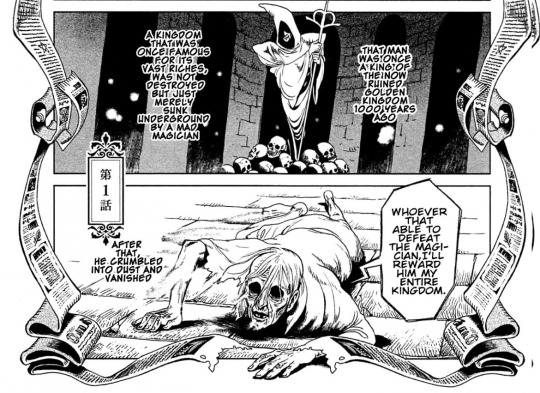
How he talks about Thistle here… it’s interesting. He does not ask for him to be talked down, or captured or imprisoned, but instead “defeated”. Which Mithrun interprets as asking for his death… which is reasonable, because that’s likely how the vast majority of adventurers interpreted his words, too. Obviously as he was crumbling to dust he probably didn’t have the capacity to be particularly verbose or explain the complex backstory to how the kingdom ended up this way, but the effect is the same no matter how he may have felt with it. He asked for Thistle to be killed.
But… even in situations where he wasn’t under any such time limit to explain what was going on, he still seemed not to. Most glaringly:

Yaad seemingly has no idea that it was Delgal’s fault that Thistle sought the demon’s power. Obviously he couldn’t talk to him about it because Thistle was, uh, a little out there by that point, but why didn’t Delgal explain? Was he embarrassed? Mournful? Couldn’t find the words?
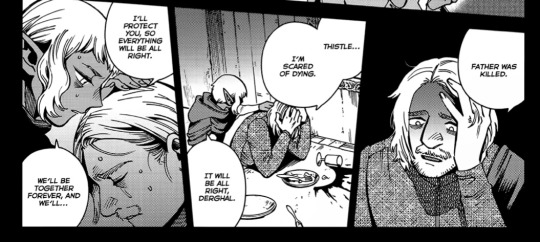
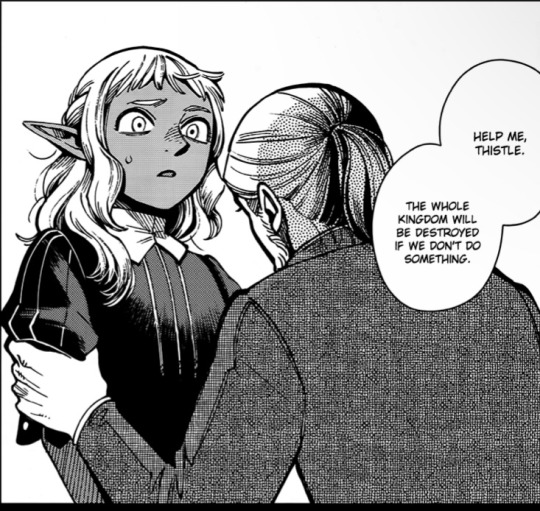
Delgal was scared of dying. He wanted prosperity at any cost, and how could Thistle possibly refuse? Did he even realize that what he was the one who pushed his own brother— One who basically helped raise him despite being a child himself, and in many ways is still a child— down this path? Or was it like watching an overzealous employee misinterpret directions?
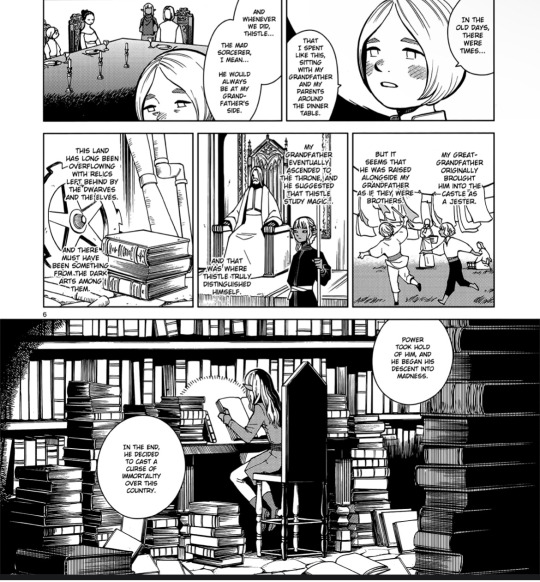
The way Yaad describes things here makes it sound like Thistle simply dug too deep in his studies and fell into madness, but we know that’s not true. Delgal didn’t “suggest” he learn magic, he wanted a mage who could help himself and his people defy death, which he admits to Thistle openly:
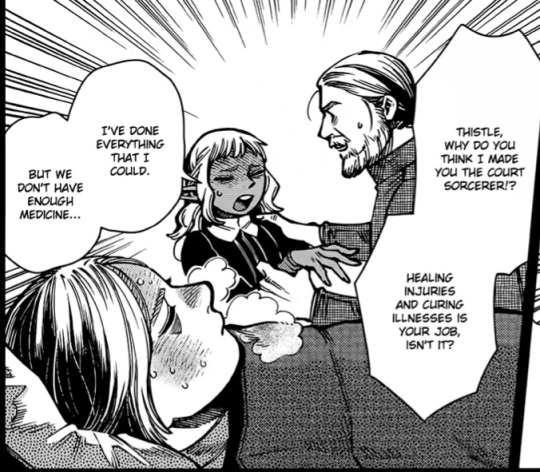
So, why? Why not tell his grandson, at least, the truth of the matter? Did he worry it might make the remaining residents more likely to upset Thistle, and therefore suffer the consequences? Did he just not care? For what it’s worth though, Yaad does suspect the truth from Delgal’s behavior.
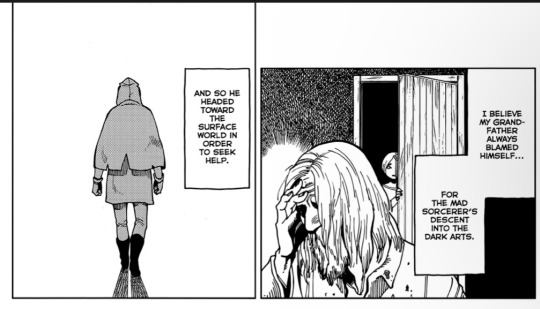
He “always blamed himself” for his descent into the dark arts. This is just Yaad’s observation, and that’s without knowing that it was quite literally Delgal’s fault Thistle went down this path. So, why? Why was it all kept a secret?
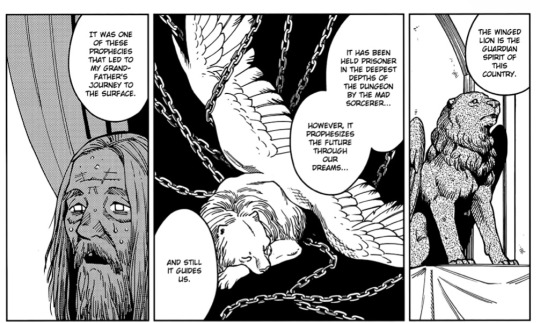
Of course, this made things ripe for the winged lion to manipulate to its advantage. Clearly despite knowing he’d pushed him into using it, Delgal still thought the lion was a force of good that was misused by Thistle as a result of his madness. His face in that last panel is particularly haunting. He looks terrible, gaunt and pale with overgrown hair and missing teeth. Had he gone mad, with grief and sorrow, as well?
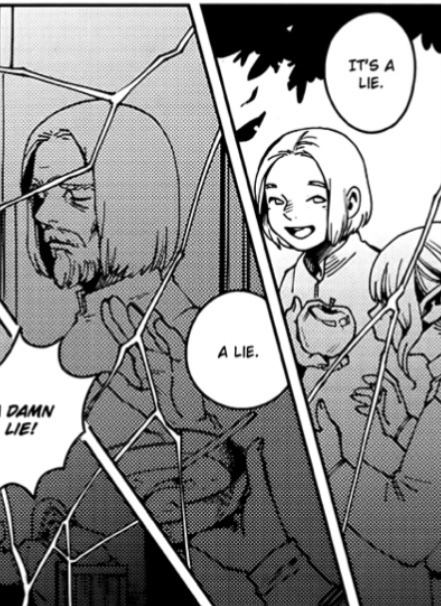
Could he no longer see Thistle the way he did when they were younger? No one can ask him, because he died long before the story even began.
To go back to the original question, well, how did Delgal see Thistle? None of the previous points make a definitive answer any clearer, and I think that’s just brilliant. And so, so tragic.
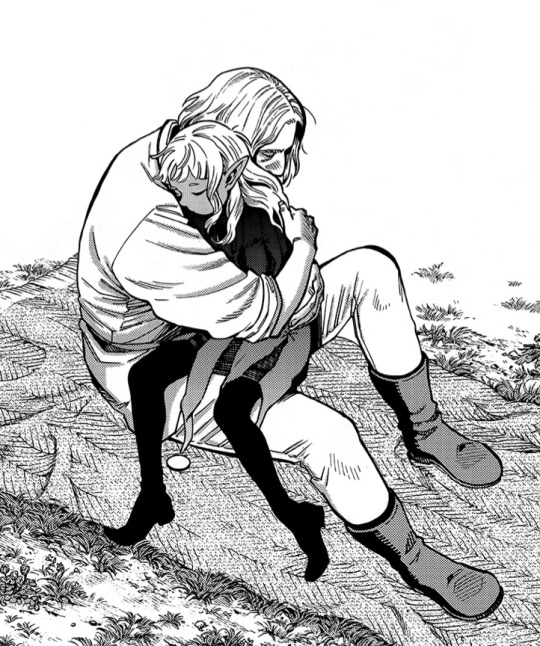
#polly speaks#dungeon meshi#dunmeshi#dungeon meshi spoilers#delicious in dungeon#thistle dungeon meshi#Delgal#yaad#the winged lion#thistle posting#dungeon meta#This has been stewing in my head for a while#I just. sobs. I both hate and love Delgal bc it’s so ambiguous how much he actually cared about Thistle#he definitely wronged him in any case but the severity is up in the air. and more importantly Thistle will never know either which is part#of what drove him to go so far to prove he was worthy of his family’s love and affection#aaaaaaaaaaaaaaaa#ok I’m normal. I’m normal#I’m so normal#(lying)#(sorry)
895 notes
·
View notes
Text
All the Champions’ demises at the Blights’ hands are tragic, but Mipha’s is forever the one that fucks me up the most when we play BotW because out of the group she is the only one that, one hundred years after the Calamity, should not be dead.
By the time that the game is taking place, Urbosa, Revali, and Daruk would have passed of old age even if things had gone right. But Mipha would still be in her early prime. Not even Queen of the Zora yet! Now that’s not to say her death is more compelling simply because she had a longer possible lifespan ahead of her. All of our companions were taken unjustly, too soon. No, what destroys me about her story every time is that…
Mipha has living family and friends.
The others are celebrated among their people, but only the Zora explicitly have citizens who personally remember their Champion. While Daruk has an entire mountain carved in his likeness, Revali has many admirers among the Rito, and Urbosa’s people speak her name with reverence, Mipha is still actively mourned. By people who knew and loved her.
Her now elderly teachers, who remain angry over her untimely loss. Her young-adult peers who recall playing with her and Link as kids. Sidon, who still wears the whistle he had as a child and who, after you complete the Vah Ruta mission, never tears himself from the plaza before his sister’s statue. King Dorephan, who asks Link about Mipha’s fate, because even after a century, he never fully gave up hope that she might be trapped, but alive.
Mipha should not be dead, but she is, and her death remains a fresh wound.
And she knows it, too. And that’s why, even when her spirit is freed, unlike with the others her story has such an air of melancholy amid the eventual triumph. She looks down upon the Domain from atop Vah Ruta, and…
“Father…are you well, I wonder? I want you to know... I have always followed my heart. I'm sorry I made you worry... I wish I could see you again... Even just once more..."
She could be there. With her father, with her little brother who is so big now, and who is trying so so hard to be like his sister. But she’s not. And she is terribly missed in a way that’s unique among the Champions.
God, it just rips my heart to pieces.
#kidk says stuff#legend of zelda#breath of the wild#this post brought to you by I’m watching olizandri’s let’s play of age of calamity and crying over Mipha and Sidon’s scenes together
2K notes
·
View notes
Text
The fact that Paul is so consistent, so unyielding in his love for John even after all these years, is what makes all of this so absolutely gut wrenching. That John: ever insecure, oh-so tortured and isolated, so sure of his unlovability - found such a gentle, strong-willed, and steady love in Paul is what makes their story the most compelling and important love story in all of music.
These two men fell in love with each other, found a home in each others hearts when the world was a cruel and scary place to be. Their friendship brought forth the absolute best parts of themselves, ultimately resulting in some of the most honest, most devastatingly beautiful music this century has ever seen.
The way in which their story is cut short, ending with brutal grief and loss, just twists the knife even further. These men, who spent their entire adult lives defined by their relationship and collaboration, who were moving through what should have been the first of many conflicts in their partnership, were robbed of any opportunity to make up and start again. The tragic reality of their unfinished, unrequited, unresolved love story is enough to shatter our hearts.
Their story is a story of fate, of poetry, of signs and of love. We know their story because it is our story. It reflects life: the highs, the lows, the love, the loss… it’s all there. It’s why I have been in love with this band for my entire life, it’s why I continue to fall in love with them over and over and over again.
God Bless Lennon/McCartney. God bless The Beatles. Nothing compares.
385 notes
·
View notes
Note
Why do you like Shannon so much?
because i look at her as a whole. she wasn't just eddie's wife. she wasn't just christopher's mom. she was a woman in her own right. and she was... she had a whole life in front of her, you know? not even at the point when she died (but that too), i mean she had her whole life in front of her at the point where she got pregnant. and we know how that was for eddie, you know? we can see, at least in some ways, the effects of christopher's birth and existence on him and how those things shaped who he was and who he became but shannon, in some way, only exists to further his story. and that's fine because, like, he's the main character. but what we do know about her is just so tragic.
think about every teenager you know. every teenager you ever knew. how many of them are ready to be mothers? how many of them are ready to be mothers to disabled children? how many of them are ready to be single mothers to disabled children? how many of them are ready to be single mothers to disabled children while their own mothers are dying of cancer, while their mother in laws are not offering support, and while they're constantly living with the fear that this is forever? because that was her reality. if eddie died overseas, that little glimpse of her life without him would have been her Entire existence for the rest of her life. and i don't know about you, but even as 20-something, that entire existence seems so daunting and overwhelming.
i don't support her for leaving christopher. she fucked that boy up, as we can see now (and have seen over the years) and she shouldn't have abandoned her son, period. have whatever feelings you want to have about your husband but don't bring your kids into that shit. you know? but when i step outside of just that aspect and look at the entirety of who she is? someone just as young and confused and scared as eddie was without receiving any of the grace and understanding that he did inherent, at least, to the fact that he was a soldier at war? i just. man. it reminds me of that poem. you know? they fuck you up, your mum and dad / they may not mean to, but they do / they fill you with the faults they had / and add some extra just for you. and it's just, like, how many choices led them to where they all were/are? all of them.
how many choices from how many people led shannon to getting pregnant by her loser boyfriend? where was her dad? texas dads don't typically let their daughters go get knocked up in high school, btw, so where was he? was he dead? was that, too, something she had to shoulder on her own/with her mom, or did she just never know him? how many choices led her to saying "enough is enough" and walking out? how many sleepless nights? how many tears? how many doctors appointments and arguments and mean words thrown back and forth led to it all just becoming too much? when did she decide she didn't want to be the bigger person anymore? because she didn't decide it the moment she left, that was when she just finally put those feelings into action. she decided it long ago. just, like, how many different choices for how many different people led to all these different versions of all these characters that we know so well?
we'll never know. at least not where shannon is involved. but we can see it in the main characters, so exploring the tragedy of shannon diaz as a viewer, and as a woman, and as a former teenage girl is just. so interesting and so compelling and so sad on so many different levels, like. she deserved better. not just her character, but she, as a woman, deserved so much better. she deserved so many more chances to be the woman/person she thought she wanted to be. when she was a little girl growing up in religious texas, i highly doubt her vision for her life included being lonely, angry, sad, and divorced. and i think the writers (and eddie) do a great job of honoring her as a human being and as a mother. she was not perfect, by any stretch of the imagination, but that's what makes her so good and so sad and i just. i just love to probe deeply into who she is even if we'll never get confirmation in canon because i think, if nothing else, the character deserves that much
173 notes
·
View notes
Text
My Lover’s Personality Is a Little Strange - By 꿀끼 (7/10)

This one is for soap opera lovers ONLY! Mad kings are great. Dumb mad kings are harder to pull off. Our tragic, gorgeous, magical, special protagonist is about as compelling as a rock too. It makes this one a hard sell.
Yvonne is a gorgeous magical sword master who is also a bastard. Her father was obsessed with his beautiful first wife, who died. He slept with a barn hand, who gave birth to her. His only daughter, who he resented. Her father was eventually kicked out of the family for being an immature piece of shit at forty.
Yvonne's happy ending has already been planned. Her parents and siblings (who all hate her father and love her) are ready to make her Empress. She's not even a teenager yet, but her future is perfect!!!
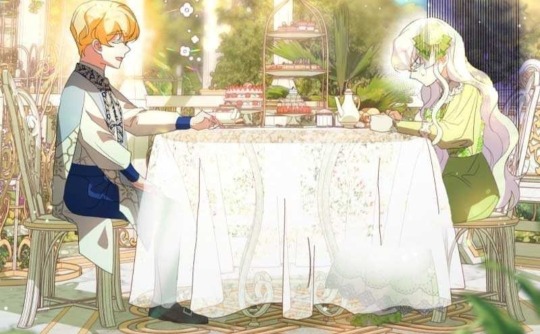
The problem is she doesn't want to be Empress. Prince Ernst is a good friend, but he's like a little brother. An annoying kid brother. It's natural that she feels that way, because she had a hard childhood. She trained hard. She's a young blade master. Of course a spoiled prince bores her.
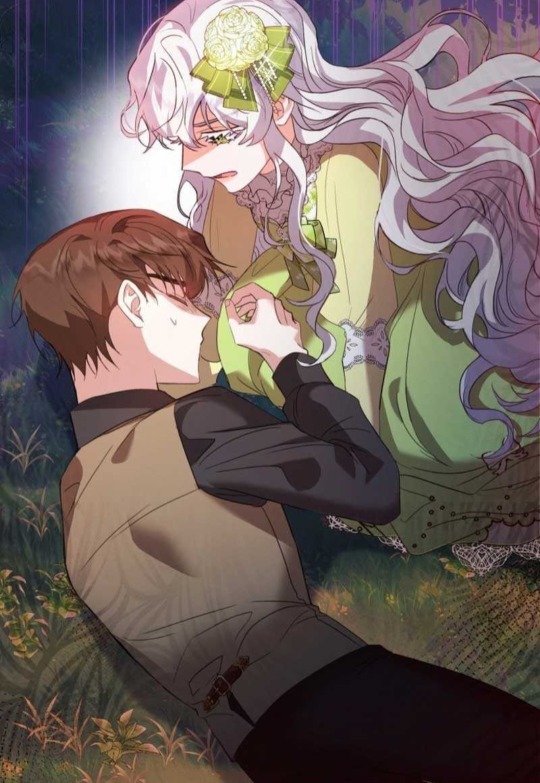
She falls for the smart and smooth Prince Theo quickly. He hides his identity to lure her in. He's an unwanted prince. Not a child of the current Empress like Ernst. He's also much stronger than Ernst and he has magic. The Empress has been spreading rumors about how vile he is, to push him away from the throne.
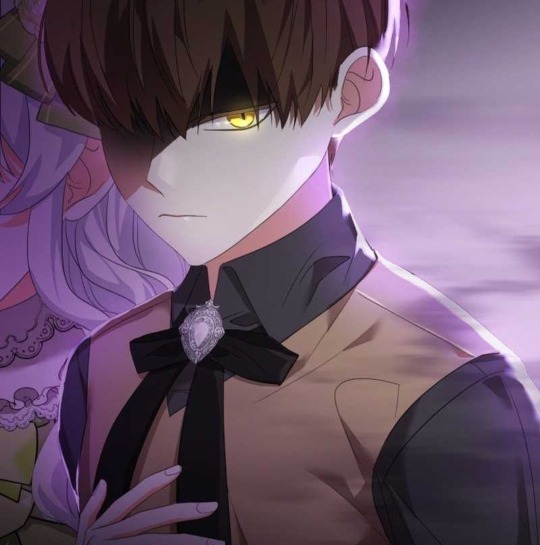
The Empress isn't a great woman, but Theo is a sociopath. A born killer who uses his magical power for torture.
Yvonne is in puppy love with him....and he feels the same way.
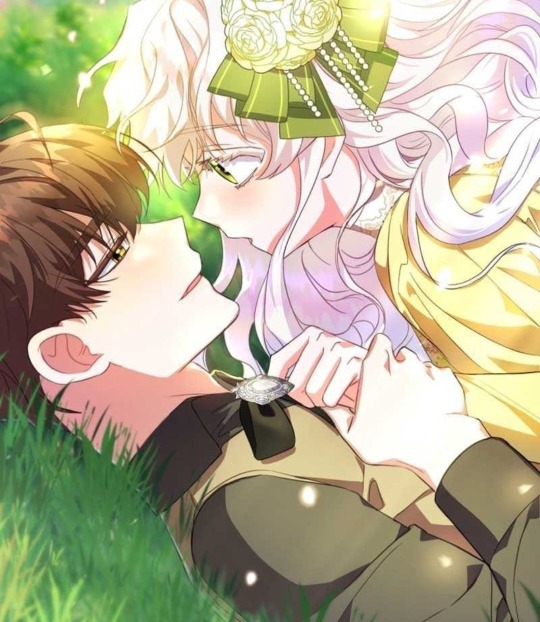
It's mutual! I'm sure they will kill the Empress together!
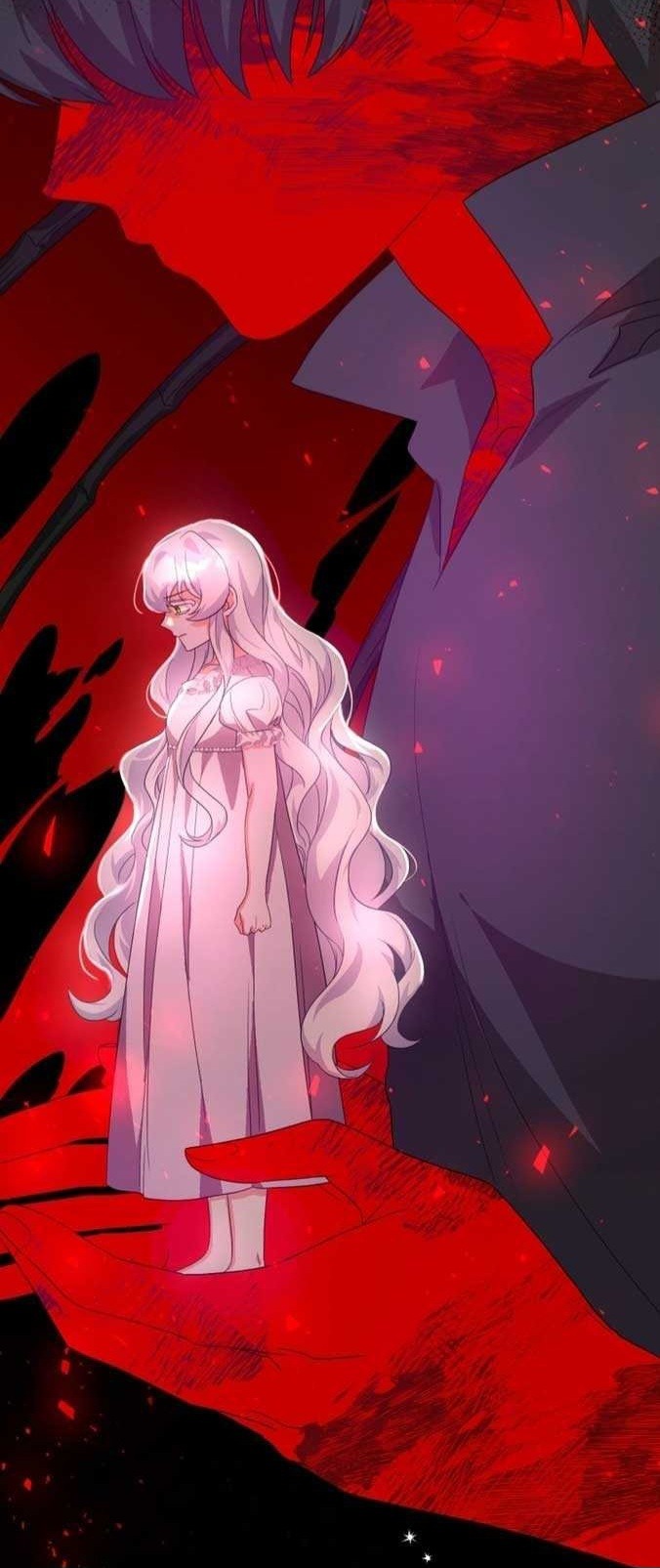
Yvonne is totally on his team. He resents the way Theo is treated. Why is he a monster, when he's only a boy...??? Boohoo...
She is so naive.
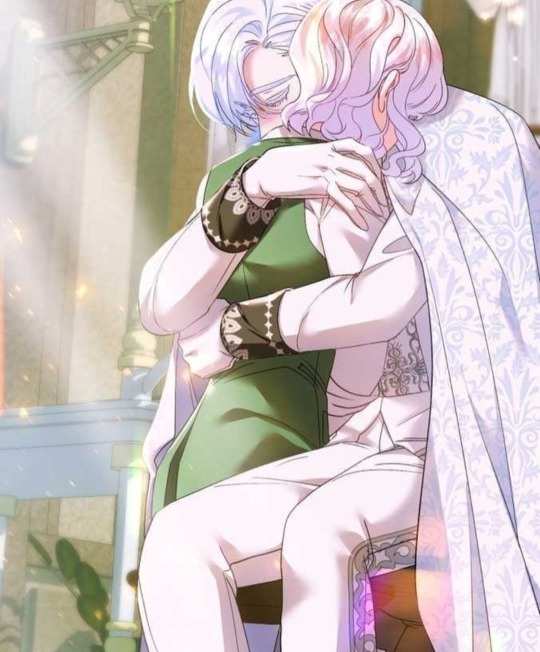
Timeskip.
Her life gets ALOT worse.
The imperial family decides to take her family down after Theo stupidly, IDIOTICALLY declares he will become Emperor in order to marry Yvonne.
The Imperial Ferdinand family shows no mercy. Yvonne watches her entire family die, and a curse is put on her. If she reveals her true name she will die, choking on her own blood. On top of that the Ferdinand family owns her. They use her as an apprentice Knight, because Benjamin wants her. Benjamin is a magical son of the Ferdinands, and he is also a yandere. He's not as dumb as Theo.

...but boy is he annoying. His introduction is lame and he's no fun.
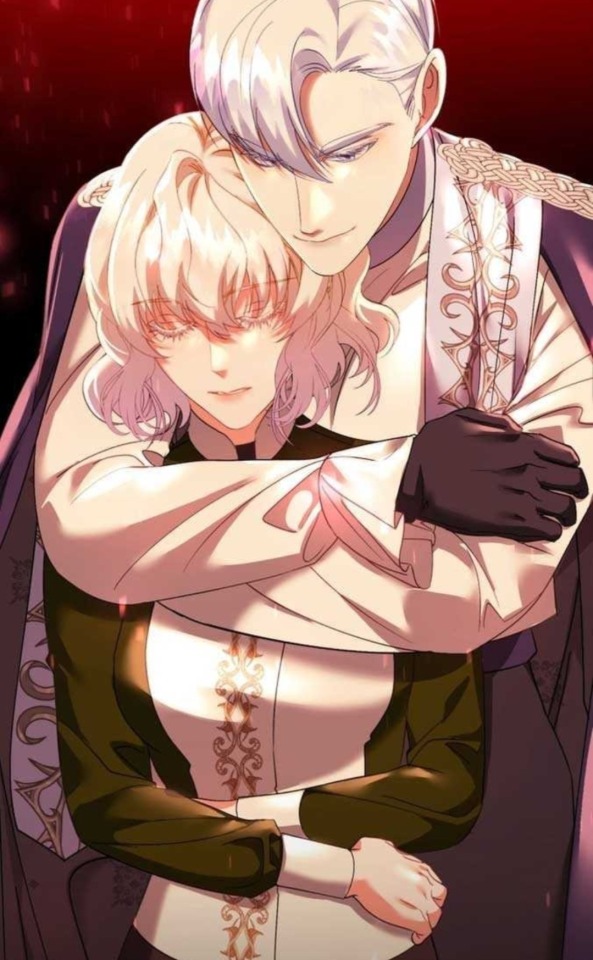
Theo and Benjamin both lack spice.

Long story short Theo loses his memory after he impregnates Yvonne. He then proceeds to abuse her and play with the fiance his family set up for him. Apparently most of this AWFUL tale is about him kissing her butt and apologizing, but it's just not worth it. She's boring. He's dumb. Even the introduction of a second yandere couldn't save this.
#yandere#male yandere#yandere male#yandere boy#recommendations#recs#rec#recommended#webtoon#otome#My Lover’s Personality Is a Little Strange
127 notes
·
View notes
Text
(Spoilers for Critical Role Campaign 1)
I don't have any expectations for wherever FCG will stay dead or come back somehow because I've spent 9 years watching Sam Riegel totally subvert my expectations in a narratively compelling way.
But I will say that "FCG shouldn't come back because it would lessen the impact of a narratively perfect death" is EXACTLY what people were saying about Percy's first death after C1 E68. (The first televised character death.) If he had to have an end, it was a fitting end that, while tragic, neatly tied up the thesis of the story. Would Taliesin even want him to come back? With Whitestone saved and Ripply killed, was there even much left to explore?
They found Percy's death letter telling them he loved them all but please bury him in a ditch with all his designs so he could be forgotten by history. He was so sorry for all he'd done and he could never make it up.
But they tried anyway, having to wrest Percy's soul away from Orthax. The players knew what they said in the resurrection ritual was meaningful along with their rolls. But they did not know they were also having to convince Taliesin. If they'd tried to appeal to Percy's soul in the wrong way, dice be damned, Percy was going to refuse. What we got was really meaningful and powerful roleplay (especially from Marisha and Laura) that did convince Percy along with successful rolls.
Being brought back did not at all weaken Percy's own sacrifice or the impact of his death. It forced him to confront everything he'd been running from. It forced him to see that there were people who loved him and would not let him throw himself away for them. They didn't want a martyr, they wanted their friend. It utterly changed the trajectory of his character.
There's only four ways I can think of on the table to bring FCG back:
True Resurrection — Incredibly expensive high level spell. They would have to find the materials as well as someone who both can and is willing to cast the spell in the middle of a war to stop a second Calamity. None of this would be easy. The ritual could still fail. FCG could decline to come back and the other players would not know that until they went to all the effort. The Raven Queen views True Resurrection as heresy which is why they didn't try it on Vax. How would a second chance change them?
Reincarnate — Lower level and cheaper spell. FCG would come back as a fleshy being instead of an Aeormaton. Would the experience live up to FCG's fantasies about it? How would it change them to realize they are truely alive, and always were, but are now also mortal? Reverse Veth story? Wild ass Pinocchio retelling? What does it mean to get a second chance but everything about you is different?
Wish — I think this would count as duplicating True Resurrection. High component cost and requires a high level magic user. (If it's duplicating a spiral there's no risk of no longer being able to cast Wish.)
Hag Deal — They do know a fatestitcher Hag who likes them and limes making deals even more. Orym may be able to just extend his existing deal. What are the consequences for the deal marker as well as FCG? Would the robit feel responsible for that person's fate? How would that affect how they feel about coming back and the meaning they need to make from it.
I don't think there's a right or best option because whatever we speculate on, the actual result will be full of meaning and very poignant. I can't imagine that Bell's Hells won't try to bring him back. They've lost so much already. They couldn't bring back Eshteross or Bertrand or Will & Derrig. They couldn't live with not even trying. Maybe their method works, maybe it doesn't. But at least they tried.
And if FCG does come back, they have to live with knowing that even though they saved their friends and put an end to Otohan, they also hurt their friends by treating themselves as disposable. They forced their friends to confront that each of them might have done the same and that's deeply unhealthy. It will change the character development tremendously.
My favorite film and play genre is where the protagonist dies (or nearly dies) (usually self-inflicted) at the beginning and has to journey through purgatory to find themselves again before they can return to the living. Films like Wristcutters: A Love Story (2006) or Castaway on the Moon (김씨 표류기 2009). Death matters because it reminds you to live. The journey is finding meaning in both life and death and coming back utterly changed.
#critical role#Critical Role Spoilers#critical role meta#critical role campaign 1#critical role campaign 3#vox machina#Bell's Hells#Percival de Rolo#Fresh Cut Grass#wristcutters a love story#Castaway on the Moon
100 notes
·
View notes
Text
okay, here’s my actual thoughtful post: I get why people are upset about the finale…I really do. but I want to mention that there’s a bigger picture to this story that’s missing if you’re zooming too close onto Izzy as a character, and I’m honestly so grateful that the show stuck to the thematic arc it introduced in season 1 because, as per usual, it’s about the themes 🤌 and this show never skimps on the symbolism!!
so here’s the thing: the primary themes are toxic masculinity (& it’s opposite, queer joy); trauma; love as a healing force for the above; and, title alert—DEATH. because it’s so much more than a cool title!
now, Izzy has always represented something metaphorical about all of these points; most directly, he’s always represented masculinity, and s2 has been an arc of toxicity deconstruction. but crucially, he’s also represented all that for Ed, who is the deuteragonist of this show. because—don’t forget—Stede and Ed are the show.
I’ve always doubted myself for feeling this after seeing how fandom saw Izzy as a third romantic figure (which like by all means have a blast in your fanfics I don’t care it’s about joy at the end of the day and pursue that as you want to), but after hearing something about djenks referring to Izzy as a father figure, it confirms a major point for me—Izzy is also in a lot of ways a parallel to Ed’s dad, and a representation of the trauma and guilt Ed felt from that formative killing. for so long, Izzy was an aggressive shadow in Ed’s life, and a tangible reminder of those daddy issues—someone telling him what to do, keeping him Blackbeard—and the beautiful thing is how that changed this season, how Izzy became a version of masculinity that could love and be beautiful and make good from the hurt, the literal poison into positivity. someone antithetical to his own paternalistic force, healing our daddy issues one drag show at a time. BUT, Izzy is still thematically representative within Ed’s arc—and by also representing the trauma that made Ed “Blackbeard,” it does make smart writing sense as to why Izzy died (NOT saying you can’t be sad about it—stick with me for a moment).
because here’s the thing—as aforementioned, this show is also about DEATH. killing is the root of everyone’s trauma, and reconciling a relationship with death is the ultimate arc Ed and Stede are both on, with the ultimate path of learning to live despite its inevitability. there’s a reason it was such a huge thing that Ed couldn’t personally kill, and then in this episode killed so many people with his bare hands in the name of love—and there’s a reason that was framed as a good thing. and there’s also Ed’s (and arguably Stede’s) active suicidality, which has been a huge force driving this season. these are characters who see death as this all-consuming thing, and they see their own deaths as the only solution. death is the traumatic force driving almost everything about their being for so long—and its reconciliation is everything for them, the greatest sign of growth. so Izzy’s death, and everyone beginning again with love—healing each other with love—is a cap to it all. it’s death as a positive force, for once. it’s death as love, not trauma. it’s death as something that will always happen, but this time not forced by your own hand. it’s a death to everything toxic, to what “Blackbeard” represented, and all the while a sort of rebirth. it’s kind of a death to…death? it’s functionally like the real physical moon replacing the giant romantic imaginary orb: it’s taking the thing that’s been artificially morphed in Stede and Ed’s heads and making it real this time, with all the bittersweet emotions that come with tangible reality.
and honestly, I’m glad that it was tragic and emotional. I didn’t think I’d be so devastated to see Izzy die, but it really did get to me, especially because of everything he said to Ricky and then to Ed. but think of it this way: Izzy and Ed might be romantically compelling because they were toxic and charged (and I hope people still enjoy everything they get from that dynamic in fan work), but imagine if the show had actually gone in that direction—where would it take us thematically? it would kill the thesis; it would be love as chaos and entertainment, but not healing. instead, this show gave us something so much more powerful: a legitimate, fully-fleshed trauma arc.
trauma hurts. Izzy’s death hurts. but that’s okay. that’s great, actually! it means the storytelling was effective—that Izzy’s arc made you feel something. and i know this won’t be every viewer’s experience, but honestly? I’m glad I can have this grieving process in such a beautifully framed light in the safe space ship of this show, because let’s be real—death, real life death, fucks you up. and let me tell you, I could’ve used this show during so many episodes of grief in my life. but here it is now, reminding us that our grief and trauma doesn’t define us—and WHAT a powerful thing for queer love, especially, to be presented as the thing that heals us all. ESPECIALLY when so much grief and death in this community is woven so deeply with the trauma of our identity.
so grieve as you need to, but don’t forget to turn the poison into positivity 💛 because that’s what the show is telling us—choose live, despite!
#djenks out here paying my therapy bill yet again#I feel like I need a million disclaimers for this post so just assume I’ve said all of them#and remember that art that hurts isn’t always a bad thing!#I didn’t think I’d have coherent thoughts yet I swear I blacked out and wrote this here we are#ofmd#ofmd season 2#ofmd s2 spoilers#ofmd spoilers#our flag means death#ofmd meta#tw: death#death#tw: suicide#suicide
276 notes
·
View notes
Text
Friendly reminder. Bruce Wayne hung up the suit and retired after THREATENING someone with a gun and this was his reaction.
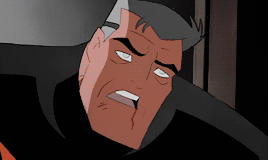
And then his immediate reaction is to shut down and close the Batcave and his only words were. "Never again"
A truly tragic, but fitting way for Bruce’s career to end. Powerful stuff. Batman's career ended the same way it began: with a desperate man wielding a gun
Batman choosing not to be weak like Joe Chill >>>> Batman going on a killing spree because fighting crime is hard.
And by the way, since Zack Snyder says his inspiration was Dark Knight Returns, I got news for you, TDKR Batman doesn't kill either.
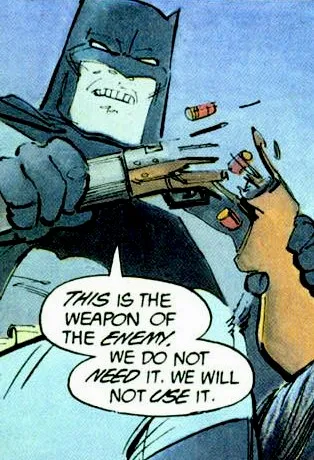
Zack Snyder is a complete blithering fucking idiot.
his statement on Batman just lines up with what I’ve seen from all of his work. He likes the idea of the comics he makes movies out of but he doesn’t actually understand their themes. A Batman that kills is pointless. An edgy Superman is not only the most boring way to write him, but doesn’t make any sense without the wholesome one. That’s why injustice Superman/brightburn/Plutonian/omniman/homelander kind of make sense in their own ways because the original exists to compare them to.(mostly also boring though) His take on watchmen was pretty much devoid of any of the actual commentary from the graphic novel, but instead was just a dark justice league that were pretty bad at their jobs. Rorschach was just framed as a kind of unhinged Batman, but still a badass that does good, which is wildly generous compared to the way he’s originally written. I can understand turning your brain off and coasting through an action movie, but his fans are delusional if they think he does any of these stories justice. I wouldn’t take any of his comments seriously if they would stop letting him make these mediocre movies.
Zack Snyder is all flash and no substance. His films are visually stunning but utterly lacking in compelling storytelling.
The point of Batman is he cannot 'stoop to their level'. He HAS to be better, he HAS to believe these criminals can be rehabilitated, because if he kills them, he becomes just like them. With his wit, his intellect, he could future proof the city against crime ever happening by just killing the criminals before they commit crimes based on probable statistics and similar themes.
But a Batman who refuses to kill is a murderer by inaction. Every time he chooses not to put Joker in the ground, he's allowed him to slaughter dozens, hundreds more, just for a laugh. Batman is equally guilty for every one of those deaths, because he could simply kill the Joker, and stop him from ever killing again. But he doesn't.
Snyder saying Batman can kill, Batman SHOULD kill, is to say that without batman doing so, or being able to, he is just as bad as the villians. Except dipshit doesn't even have his Batman kill The Joker. "Oopsie daisy, Joker got out and bombed a hospital full of people, sowwwwyyyy, I put him back in jail again dunt worry TeeHeee :3". And then next week we do it all over again. OR. You kill the Joker, and he never hurts another person again.
Which is why Jason Todd works so well as a counter to batman, and SHOULD be what Snyder is looking into. The reason why Zod works so well as a villain is because Humans are flawed apes who cant be trusted to govern themselves and should be conquered, and Superman, a literal God, could fix all that, but doesn't, because of Hope. Its foolish, childish even, to consider that a solution. And when placed in the vacuum of a comic book it works because you have to suspend disbelief, and forget that Superman let a city full of people die while he punched Zod through skyscrapers.
If you want Batman to kill people, just go and read one of his 1784956th copies that kill people. Go read Midnighter. Go read Punisher. Go read Moon Knight. Go read Peacemaker. Go read Nighthawk. What is stopping you?
I'm sure all those characters have brought about the peace and prosperity and the crime-free society that a "killer Batman" was supposed to. "Punisher would clean Gotham in under a week", right, just like he cleaned Marvel's New York, didn't he?
It has to be Batman specifically the one doing the killing? The number of superheroes that kill is nowadays much higher than the number of heroes who don't. Remember how Hawkeye spent the better part of his existence being the most anti-killing Avenger? Nowadays he is known as a super-assassin that "never had a non-kill rule". Should heroes who don't kill go extinct?
I like that Batman doesn't kill people. I feel no need to turn him into something he isn't like it was done to Hawkeye. If I wanted a Batman that kills, I would go and read one of the thousand "Batman who kills" out there.
Batman should not kill and should never kill.
"Gotham would be better off if Batman just killed The Joker"
You. Miss. The. Entire. Point.
Bruce Wayne lost his parents to crime and Bruce Wayne is a child who died alongside his parents and was reborn as a creature dedicated to insuring it never happened to any other child. He made a vow never to reduce himself to the criminal scum’s level or to Joe Chill’s level. He never kills for a reason.
Batman not killing is what makes him so compelling, if he kills criminals, there is no moral conflict, he is no better than the Punisher, Wolverine or any other dark edgy hero. Hell, if he starts to take a life, Batman is no better than Ra’s Al Ghul.
In the Daredevil Netflix show, Frank Castle told Daredevil this “That’s not how this works. You cross over to my side of the line, you don’t get to come back from that. Not ever.” That alone is why Batman should not kill, not even The Joker. Bruce Wayne is not Frank Castle, stop trying to make him Frank Castle. I mean…Stan Lee was absolutely disgusted when someone called The Punisher a hero, Frank Castle is a murderer, not a hero. How is this so hard for people to understand?
I don’t want to hear that Batman killed in the old comics and I don’t want to hear Elseworld stories. It’s an established fact that Batman does not kill and it’s a big part of his character.
Guess what? We already got a Bruce who killed The Joker, it happened in the Burtonverse/Schumacherverse and he was disgusted with himself. “So, you're willing to take a life.” “Long as it's Two-Face.” “Then it will happen this way: You make the kill, but your pain doesn't die with Harvey, it grows. So you run out into the night to find another face, and another, and another, until one terrible morning you wake up and realize that revenge has become your whole life. And you won't know why.”
A huge part of Bruce’s character is that he doesn’t kill, no matter what. Same with Clark. But edgelord writers from the New 52, DCEU and the Injustice abominations think it’s cool to make heroes kill. Heroes should not kill. You can’t be a hero and a killer. IT DOESN’T WORK THAT WAY!
Guess what would happen if Batman kills The Joker? The Joker wins. The Joker and Batman are each trying to prove a point to society - and really to us, the readers. The Joker wants Batman to kill him because he perfectly embodies chaos and anarchy and wants to prove a point to everyone that people are basically more chaotic than orderly. This is why he is so scary: we are worried he may be right. If the Joker is right, then civilization is a ruse and we are all truly monsters inside. If the Joker can prove that Batman - the most orderly and logical and self-controlled of all of us - is a monster inside, then we are all monsters inside, and that is terrifying. The Joker is terrifying because we fear that we are like him deep down - that he is us. Batman is what we (any average person) could be at our absolute best, and the Joker is what we could be at our absolute worst. The Joker’s claim is that we are all terrible deep down, and it is only the law and our misplaced sense of justice that keeps us in line. Since Batman isn’t confined by the law, he is a perfect test case to try to get him to "break.” The Joker wants Batman to kill a person, any person, but knows that the only person Batman might ever even remotely consider killing would have to be a terrible monster, so is willing to do this himself and sacrifice himself to prove this macabre point. Batman needs to prove that it is not just laws that keep us in line, but basic human decency and our natural instinct NOT to kill. If Batman can prove this, then others will be inspired by his example (the citizens of Gotham, but again, also the readers), just as we are all inspired every day to keep civilization running smoothly and not descend into violence, anarchy, and chaos. This ability to be decent in the face of the horrors and temptations present all around us is humanity’s superpower, the superpower of each of us. The struggle of Batman and the Joker is the internal struggle of each of us. But we are inspired by Batman’s example, not the Joker’s, because Batman always wins the argument, because he has not killed the Joker.
Batman not killing matters. Batman stories to me are the ultimate tale of turning pain and suffering into something positive. That is a story that everyone can relate to because let's be honest here. The world can suck. I've experienced and probably will always experience feelings of fear of depression of anger of angst. It's in my nature as a human being to experience those things. It's in all our nature it is what we choose to do with that pain that we all feel that defines us. Batman chose to turn all those negative emotions, he feels into a symbol that can bring people. Hope that Batman will save us from pain but more importantly hope that we can all be Batman. Why do we fall? And Batman Begins explains this best “Why do we fall sir? So that we can learn to pick ourselves up.”
Yes, Bruce Wayne is a flawed crazy person. He is at times mean stubborn and even abusive but he is still good. He is still someone we can aspire to be. We can try our hardest to be Superman but no human being can fly, but we can still try to be Batman We can all try to turn our pain into something good when I see Batman killing people or fans saying he killed before and he should kill The Joker, It pains me. It actually hurts my soul. Batman is not about finding a way to kill evil. But try to redeem it. His mission is an impossible task. Maybe he should kill people. Maybe he should kill The Joker, but what makes him fascinating what makes him a hero Is the fact that he has that moral code and stopped himself from crossing that line That's why I always looked up to Batman even as a kid despite all the adult subtext or mature themes superheroes are for kids. And killing is not Batman and it is not Bruce Wayne. This is why I hated the portrayal in the DCEU and the Burtonverse and why I really hated the implication that Batman killed The Joker in Batwoman. A Batman who kills is certainly not Bruce Wayne, that is an interpretation of Bruce Wayne that completely misses the point of Batman. It's easy to kill. Batman does not make the easy choice… Batman does not kill.
95 notes
·
View notes
Text
more rambling thoughts about wuthering heights now that i've finished my re-read
1 wuthering heights is basically the looney tunes if the looney tunes were goth. 90% of the novel is people arguing, dying, and running around threatening to kill each other, and often all three of those at once.
2 love how it's filled with dark humor. "he's such a cobweb, a pinch would annihilate him" is such a camp thing to say about the terminally ill child you abhor and who you spend weeks trying to set up on dates with your dead lover's child so you can steal her property when your son finally dies. heathcliff lecturing his son on Seduction 101 right in front of cathy 2.0, trying ridiculously to play cupid and compel them to fall in love with each other before giving up and just kidnapping her instead... surely he's the most insane brontë man?
3 i can't remember what i had for dinner last night but nelly dean can remember what the weather was like on any given friday twenty years ago (love her and her snarky comments)
4 love how after nelly finishes telling the story to lockwood she's like "any way. so you know cathy 2.0 is single right ;)))" and then cathy 2.0 shows zero interest in him. so then he's like "oh i just remembered i have somewhere to be :/" then fucks off to london for nearly a year then when he comes back nelly is like "nvm as it turns out cathy and hareton are actually soulmates lol who knew! gee, it's a good thing she didn't like you!" and he's just silently suffering. emily was just fucking around here. hindley was the only linton/earnshaw/heathcliff who was wild enough to marry someone who didn't share either his gene pool or his neighborhood.
5 i imagine joseph to look like smeagol from the lotr films but taller
6 [heathcliff, after stabbing his alcoholic arch nemesis and then pushing his servant into the puddle of the blood] "Wash that stuff away; and mind the sparks of your candle—it is more than half brandy!” LMAO
7 this opinion list is just turning out to be a list of the most insane heathcliff moments but truly the novel should've just been called "heathcliff"
8 heathcliff's weird paternal feelings for hareton, saving hareton's life, him saying he would truly love him if only he wasn't hindley's child, basically giving hareton his blessing to love cathy 2.0 toward the end... so oddly endearing
9 heathcliff walking out just before the "i am heathcliff" part of her speech. why WHY
10 hindley protecting isabella from heathcliff before she flees was nice and i wish we saw more of their dynamic around the heights. honestly aside from the child neglect (which is par for the course in wuthering heights) hindley is a pretty sympathetic character; his rivalry with heathcliff was fueled by both sides and truly the fault of their father for pitting them against each other by letting heathcliff usurp hindley's place of favoritism as a boy. hindley's gambling and drinking, his general dissipation and failure to secure his son's future, are all tragic.
11 i think hindley/edgar/heathcliff are all interesting foils for each other; they each lose the women they love and are left to be single fathers, and each responds to the task totally differently. if we include mr. earnshaw, all the fathers in the story essentially fail their children after all the mothers die. hindley and heathcliff have a special parallel through their lifelong brotherly competition, the women they love both dying in childbirth, and in their own deaths. hindley slowly kills himself while ignoring everyone around him; heathcliff also kills himself, but only after trying to systematically ruin the lives of everyone around him. they also say that they want to kill each other but fail when they try; heathcliff nearly kills hindley but ends up saving his life at the last minute.
12 heathcliff jr. is so terrified of heathcliff sr. and so traumatized and petrified by fear and he doesn't deserve the hate he gets for being annoying. he's been sheltered his whole life, his mother just died, he was sent to his uncle/cousin only to be immediately torn away from them to be abused by a stranger who treats him horribly, he's terminally ill, he's still a kid, he's threatened into marrying someone he barely knows, etc.
13 if any of you have seen the british comedy show "the young ones" that's literally hindley's household in wuthering heights when joseph/hareton/hindley/heathcliff/isabella all live together. the filth, the slop for dinner, the petty games, the violence, the fierce hatred yet weird loyalty to each other, etc.
14 i really wonder how cathy would have reacted to heathcliff's treatment of everyone else if only she had known the full details (ie his harsh abuse of isabella, his son, cathy 2.0, etc.)
15 heights was my first brontë novel but i think i like jane eyre and tenant better now that i've read them all back to back! next on the list is likely agnes gray. anne, my underrated queen!
#literature#english literature#wuthering heights#emily brontë#book opinions#bookblr#bronte sisters#heathcliff#books#book thoughts#book review#classic literature#lit#litblr
200 notes
·
View notes
Note
Speaking of martial competence, do you have any examples of characters that are actually written with this in mind?
Loads. Some actually even make good on that.
So, there's different kinds of martial competence. There are characters who are proficient in combat directly, there are well written strategists, there are characters who excel at military leadership, and when they're written well, you can actuallylearn some things from them.
I'm going to give some examples, and at least one cautionary example.
For, just, raw combat prowess, I still go back to Robert E. Howard's Conan short stories. It's easy to meme on the character, especially 90 years after the fact, with the cultural persona that's grown around him, but Howard's original writing is excellent. The character would not have survived Howard's early (and, frankly, tragic) death if it was just the one note gag you might expect, if your only exposure to the character was through cultural osmosis and the films.
Howard's fight scenes were shockingly well written. To the point that it is still absolutely worth reading if you want to write a fantasy fighter.
For strategists, three characters come to mind, but only two are literary, and all are Science Fiction.
Grand Admiral Thrawn is probably one of the best villains Star Wars has ever produced, it's part of why he's one of the few characters that's migrated from the original EU to the Disney era. My personal take is, as a character, he's lost a lot over the years, but the original incarnation from the early 90s novels is a very solid model for a strategist. Particularly in how he takes time to understand his opponents while looking for potential weak points to exploit.
His practice of studying a culture's art to understand their psychology might sound a bit goofy, but the concept does have a real basis. (At least, until it metastasized into a superpower, in later adaptations of the character.) Being able to psychologically assess your foe is an incredibly valuable element of strategy, and one that you probably want to consider when you're writing a character who is supposed to be a “strategic genius.”
When writing fiction, you want to consider all of your characters as if they were people, rather than as hollow, plastic toys. And, yes, the obnoxious villain who knows exactly what your heroes will do because of authorial fiat is going to be a more compelling character than the ambulatory goldfish villain who exists as a prelude for your heroes showing off how badass you think they are.
Granted, even in Heir to the EmpireThrawn was already drawing strategic insights that strained credibility, but understanding your foe is an element of strategic thinking that is often forgotten in literature. So, even as a villain in a tie-in novel (we're not done with tie-in fiction yet), he is worth looking at. At least when written by Timothy Zhan, Thrawn was a well written character, and even if he bordered on a Mary Sue at times, he escaped a lot of that stigma by justifying his competence.
It's also probably worth mentioning in passing that he's one of the few Imperial leaders in Star Wars who isn't also criminally incompetent.
The non-literary example of a strategist would be John Sheridan from Babylon 5. Unlike Thrawn, Sheridan's main strategic focus is on situational exploitation. A little of that comes from his knowledge of enemy procedures and psychology, but at lot of it comes from a rather ruthless approach to technical limitations. An alien race is using technology that blocks human targeting systems? Set up a nuclear mine and then send out a fake distress single to lure them in. Need to deal with a significantly larger, more dangerous ship? Lure them into a gas giant and and let the planet's gravity well drag them past crush depth. Bruce Boxleitner's performance helped sell the character, but Sheridan is a really solid science fiction strategist, who really exemplifies how technical limitations can have enormous strategic considerations.
I'm not citing Sheridan as an excellent example of a leader per se,it's certainly there, but it is harder to unpack from Boxleitner's performance. It does have some good payoffs much later in the series when he starts making some orders that cause his subordinates to sit up and stop what they're doing. And that is a consistent theme even back to his introduction, but, it's a tangible consequence to an intangible cause.
The last example is a negative example, both for strategy and leadership. And, as much as it pains me to say this, at least Orson Scott Card understood that Ender was a bad leader. At least in the original novel. To be blunt, Ender is a mediocre strategist at best. His highlights in the book involve, “inventing armor,” and creative movement in micrograv. That's setting the bar exceptionally low, and while it is reasonably within the range of what you could expect from a pre-teen, that's not much of a justification.
Again, I'm not a fan of Card, and I'm reallynot recommending Ender's Gameto anyone. However, if I didn't mention it, you know there'd be a reblog going for twelve hundred words about how Andrew Wiggin is the best strategist in literature, which, yeah, no.
Do you want a goofy, tie-in fiction, literary suggestion for the best leader in sci-fi? Too bad, because I'm pretty sure Ciaphas Cain is not that person. The Ciaphas Cain novels by Sandy Mitchell are unusual as leadership recommendations, because of how much Cain internally processes the social manipulation involved in military leadership. He's not a great leader, but he is exceptionallygood at explaining to the reader how he's creating that illusion to motivate the soldiers around him. In fairness, some of that is an intrinsic character flaw, he is incredibly insecure, and desperately trying to hide that fact. And the difference between being a great leader, and effectively creating a comprehensive illusion of a great leader is: There is no difference. As a serious complement, it is one of the few times I've seen an author treat leadership as an actual skill, and not simply an extension of a character's charisma. Which is why I'm singling this one out. It might sound like a joke inclusion initially, and the books are quite funny in a Warhammer 40k kind of way, but there is quite a bit of value to be had.
-Starke
This blog is supported through Patreon. Patrons get access to new posts three days early, and direct access to us through Discord. If you’re already a Patron, thank you. If you’d like to support us, please consider becoming a Patron.
#writing advice#writing reference#writing tips#how to fight write#starke answers#Babylon 5#Grand Admiral Thrawn#Ciaphas Cain
387 notes
·
View notes
Text
// TWST Book 7 spoilers, thoughts of Malleus's writing as a character
So I was reading some other people's opinions on why some people consider Malleus overrated/annoying, and tbh this makes me really sad. The general consensus is that a lot of people fixate on certain sides and can only see him as one extreme or the other and it results in many ppl thinking a watered down version of his character is how he is in canon.
I feel that its such a shame because he's the most interesting, compelling and well-rounded take on his character archetype I've seen.
From my observation, usually they kinda make this archetype (the broody misunderstood 'everyone fears him like a monster except for one special person') someone you can't take that seriously, because of how his struggle usually kind of written in a way where everyone involved feel less like actual fully fledged original characters and really just one note tropes interacting with other one note tropes.
To elaborate: What i mean when i say this is usually ppl who hate him kind of just do because of plot requires them to and to show how all their haters are "normies" who can't get him because 'he's not like everyone else'. The misunderstood guy still usually has toxic personality issues but the story really tends to make it feel like they don't fear him for that but because they're shallow and have prejudice to ppl like him, so his personality issues are not framed as wrong or character flaws.
I don't think there's anything inherenrly wrong or mediocre with the "one special person who gives him a chance before anyone else" trope like I'm literally a Malleyuu enjoyer lol but like i said its all in the execution cause otherwise it fails to be compelling and believable. Usually in the poorly written version of this trope the guy doesn't undergo any character development other than showing more emotion and kindess to his partner because they melted his ice I guess so it really makes his whole character feel like its revolves around the sake of romance and fanservice.
Malleus doesn't fall into this trap in my opinion because his situation despite how fantastical it is, the way he was written makes it believable as to why everything is the way it is with him, and it also challenges the viewer if they would be able to say they wouldn't fear him too in that situation.
"We're gonna give you this character who everyone sees as a monster and show you deep down he just wants the same love as everyone else, making you contemplate changing judgement on him. He wants to prove this, but his way of going about it always inadvertently harms others."
"You know where hes coming from and if he had that social connection to give him a better understanding of others this wouldn't be happening, but its also equally understandable that the people hes trying to connect with don't deserve this and fear him even more after this, trapping him in a cycle of isolation."
"Given his track record, do you go about giving him a chance or just considering the repeatedly proven danger he brings. With the valid reasons of both parties, can you really say he isn't a monster and demand that 'if only people be near him'?"
There's just such a tragic and thought-provoking dilemma to his character that adds so many layers that makes him so good.
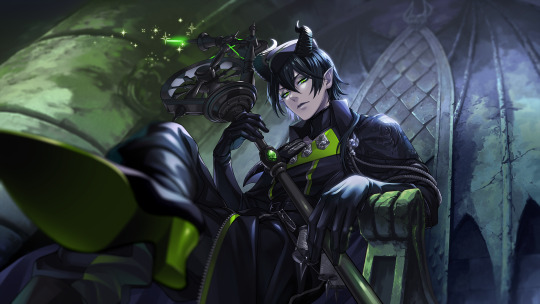
As omniscient viewers we have the benefit of seeing what he's going through form his POV so we can sympathize with him and understand that he thinks what he's doing is the best course of action and he's just trying to create a "win for everyone" situation.
But also everything he does ironically reaffirms everyone's fear and distrust of someone like him. No one can deny he has a tendency to cause further destruction when he tries to do something "good", examples including: past Briar Valley lantern lighting fire, the Halloween 2 ghost world party, and now his Sleeping Curse stunt in Book 7 Part 2 (they really emphasize this by making the spoken name of his UM basically mean "Malicious Fairy" but have its written name used to convey what its meant to mean be "Blessing").
↑ Given this, it honestly makes sense others, especially those who don't know him all that well, would just expect the worst when he's around already, and you wouldn't be able to blame them for that given the track record. It doesn't help that this impression is worsened since he tends to cause misunderstandings due to his lack of familiarity with human social cues.
Alongside the bias and preconceived notions from his status and reputation, they also make a point on how his personality flaws are still also a huge factor in pushing people away, such as not being able to see things through the perspective of others.
He also holds a subconcious belief due to what has been ingrained in him since childhood as a Draconia and the next in line that because he's superior to others at certain things, he has the right and responsibility to decide on what will protect and help them, disregarding the individual values/priorities of human beings and leading him to take reckless and destructive action with good intentions.
His upbringing, character strengths and character flaws are all realistically connected to each other and the way they are subtly shown to be ever-present in defining his decisions, goals and thoughts throughout the whole story. So we don't really need to have a character go out of their way to exposition this to us this word for word just so we can understand and believe it.
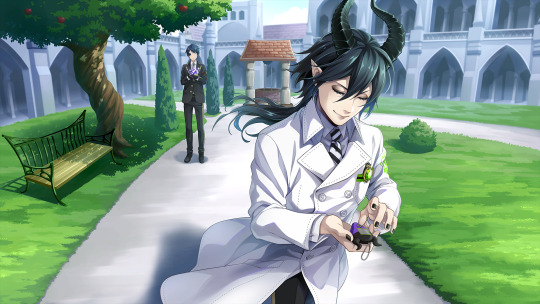
Moving onto something slightly more lighthearted, I really also like how dorky Malleus surprisingly was. Other similar characters in the archetype I usually see don't really have any hobbies, interests, or quirks outside of being a broody authority figure, which might've been appealing to some at first but it really just gets stale and boring after a while.
This should be the bare minimum in making a fleshed out and interesting character so maybe i sound like im giving them too much credit for pointing it out😭 But yeah compared to the other examples it's good that Malleus has his Tamagotchi and Gargoyle interests it makes him feel like a believable person who has his own life going on too (with the bonus that these interests are also metaphors for aspects of his character). The gap moe adds an endearing side to him, and makes the gap between his intent and impact of his actions even more tragic. It wouldn't hit the same without this side.
(^ Forgot how the exact quote goes, but it basically said dark stories are more effective when there are moments of genuine happiness and good in them, compared to if it was always just grim and edgy. The former increases the stakes and tragedy because you have something you to care about losing, while for the latter there is nothing for you to care about so nothing the story does really matters. Same logic applies to Malleus)
Overall, it's just like an unfortunate incompatibility of goals and circumstances, which is what TWST is all about. Another thing I want to say is out of all the characters, I feel like Malleus is the one who is the ultimate embodiment of TWST's main themes:
-> How it's not about "hero" vs "villain" just differing circumstances crossing paths and clashing because of how people on either side have their own complex perspective and dreams they want to realize
-> And how connection and finding community is important to find people who will help you make up for what you lack in reaching your goals and to better understand all the factors that caused the situation in the first place.
As if seeing yourself reflected in a mirror, the more you get to know the people around you, you realize in many ways you are actually quite alike, and through understanding others you could also possibly better understand certain aspects of yourself. It's sort of encouraging you to do the opposite of dehumanizing others and yourself, which is something Malleus has most evidently internalized.
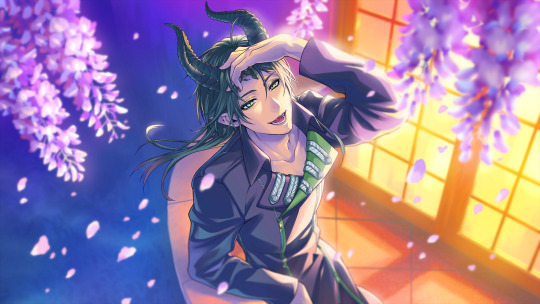
So yeah this was so long😭 I had a lot I wanted to say since Malleus is my favorite TWST character. Idk if I missed anything or if i managed to express my thoughts in a cohesive way but yeah. I kinda go into a rage whenever I see the worst takes ever be put out about his character but tbh sometimes I can't completely blame others since fandom trends and the convenience of simplifying things into tropes can warp your perception of a character and what you associate with them.
Also sometimes twst doesn't do a good job with utilizing his character like Book 5 where he got turned into a deus ex machina and Halloween 2 where they killed any hype and intrigue for the plot we had at the beginning through the ending reveal and gave the worst justification ever for Malleus and Lilia's actions ever.
Regardless, I hope more people manage to move past this and appreciate his character for what it really is soon though. He's an amazingly tragic character; a lot of thought was put into how his experiences, strengths and weaknesses would convincingly connect, and he represents something relevant in the story's plot and themes.
The fact that I've seen some people unironically believe that Malleus may just be faking his cluelessness of social cues to hide his "true evil" is evidence to how convincing his character's situation is, that even some in the audience who know more about him than the characters would still end up in the same place of doubt and distrust of Malleus because of what he's capable of.
Aight thank you for reading👍
#twst#twisted wonderland#twst book 7 spoilers#malleus draconia#twst writing analysis ?#diasomnia#i am his number 1 defender#ignore me just putting random photos in between text i tried separating chunks of text to make it more readable lol#twst character analysis ?
499 notes
·
View notes